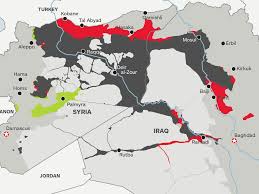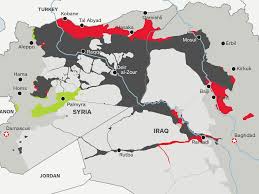
While claiming that no other country is fighting Islamic State as Ankara is, President Tayyip Erdogan of Turkey said that the country has killed 3,000 Islamic State fighters in Syria and Iraq.
NATO member Turkey faced criticism in the earlier stages of the Syrian war for failing to stop foreign fighters crossing its borders and joining the radical group and the country was initially a reluctant partner in the U.S.-led coalition against Islamic State.
The Syrian border, where the Turkish town of Kilis has been hit for weeks by repeated rocket fire requires more help from Western allies in particular, Turkey has said, in its fight against Islamic State in general.
On the other hand an unlikely alliance has developed against the Islamic State in a remote corner in Iraq. Together the two relatively obscure groups have opened up a new front against Islamic State militants in a remote corner of Iraq even though they share little more than an enemy and struggle to communicate on the battlefield.
In what is being viewed as a measure of the extent to which Islamic State has upended the regional order, re unlikely alliance has been forged between an offshoot of a leftist Kurdish organization and an Arab tribal militia in northern Iraq.
Competing to claim fragments of territory from Islamic State and complicating the outlook when they win, across Iraq and Syria, new groups have emerged where old powers have waned.
"Chaos sometimes produces unexpected things. After Daesh (Islamic State), the political map of the region has changed. There is a new reality and we are part of it," said the head of the Arab tribal force, Abdulkhaleq al-Jarba, reported Reuters.
When official security forces failed to defend the Sinjar area against the Sunni Islamic State militants who purged its Yazidi population in Nineveh province, this "new reality" was born in 2014.
A local franchise called the Sinjar Resistance Units (YBS) was set up after a Syrian affiliate of the Kurdistan Workers' Party (PKK) came to the rescue, which won the gratitude of Yazidis.
The mainly Kurdish secular group recently formed an alliance with a Sunni Arab militia drawn from the powerful Shammar tribe. The Kurdish securlar group includes Yazidis which controls a pocket of territory in Sinjar.
"In the beginning we were unsure (about them). We thought they were Kurdish occupiers," said a wiry older member of the Arab force, which was assembled over the past three months and is now more than 400-strong, Reuters reported.
Many Yazidis say they cannot live together again and accuse their Sunni Muslim neighbors of complicity in atrocities committed against them by Islamic State and hence the cooperation between them is all the more unusual.
The village of Umm al-Dhiban, a cluster of adobe houses along a highway near the Syrian border was the first place that the YBS-Shammar alliance won its first joint victory against Islamic State last month. The alliance are now fortifying their positions.
While it seems highly unlikely that these two groups would continue to carry the alliance in the long term, for now, the external forces pushing the two groups together are stronger than the differences that could drive them apart.
(Source:www.reuters.com)
NATO member Turkey faced criticism in the earlier stages of the Syrian war for failing to stop foreign fighters crossing its borders and joining the radical group and the country was initially a reluctant partner in the U.S.-led coalition against Islamic State.
The Syrian border, where the Turkish town of Kilis has been hit for weeks by repeated rocket fire requires more help from Western allies in particular, Turkey has said, in its fight against Islamic State in general.
On the other hand an unlikely alliance has developed against the Islamic State in a remote corner in Iraq. Together the two relatively obscure groups have opened up a new front against Islamic State militants in a remote corner of Iraq even though they share little more than an enemy and struggle to communicate on the battlefield.
In what is being viewed as a measure of the extent to which Islamic State has upended the regional order, re unlikely alliance has been forged between an offshoot of a leftist Kurdish organization and an Arab tribal militia in northern Iraq.
Competing to claim fragments of territory from Islamic State and complicating the outlook when they win, across Iraq and Syria, new groups have emerged where old powers have waned.
"Chaos sometimes produces unexpected things. After Daesh (Islamic State), the political map of the region has changed. There is a new reality and we are part of it," said the head of the Arab tribal force, Abdulkhaleq al-Jarba, reported Reuters.
When official security forces failed to defend the Sinjar area against the Sunni Islamic State militants who purged its Yazidi population in Nineveh province, this "new reality" was born in 2014.
A local franchise called the Sinjar Resistance Units (YBS) was set up after a Syrian affiliate of the Kurdistan Workers' Party (PKK) came to the rescue, which won the gratitude of Yazidis.
The mainly Kurdish secular group recently formed an alliance with a Sunni Arab militia drawn from the powerful Shammar tribe. The Kurdish securlar group includes Yazidis which controls a pocket of territory in Sinjar.
"In the beginning we were unsure (about them). We thought they were Kurdish occupiers," said a wiry older member of the Arab force, which was assembled over the past three months and is now more than 400-strong, Reuters reported.
Many Yazidis say they cannot live together again and accuse their Sunni Muslim neighbors of complicity in atrocities committed against them by Islamic State and hence the cooperation between them is all the more unusual.
The village of Umm al-Dhiban, a cluster of adobe houses along a highway near the Syrian border was the first place that the YBS-Shammar alliance won its first joint victory against Islamic State last month. The alliance are now fortifying their positions.
While it seems highly unlikely that these two groups would continue to carry the alliance in the long term, for now, the external forces pushing the two groups together are stronger than the differences that could drive them apart.
(Source:www.reuters.com)





